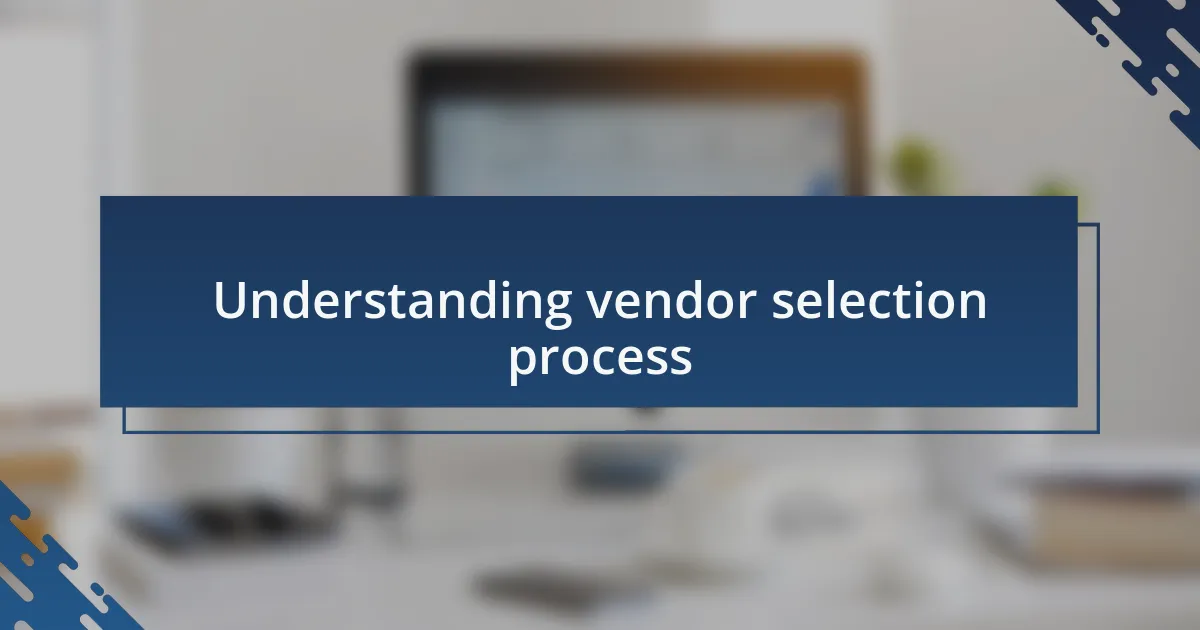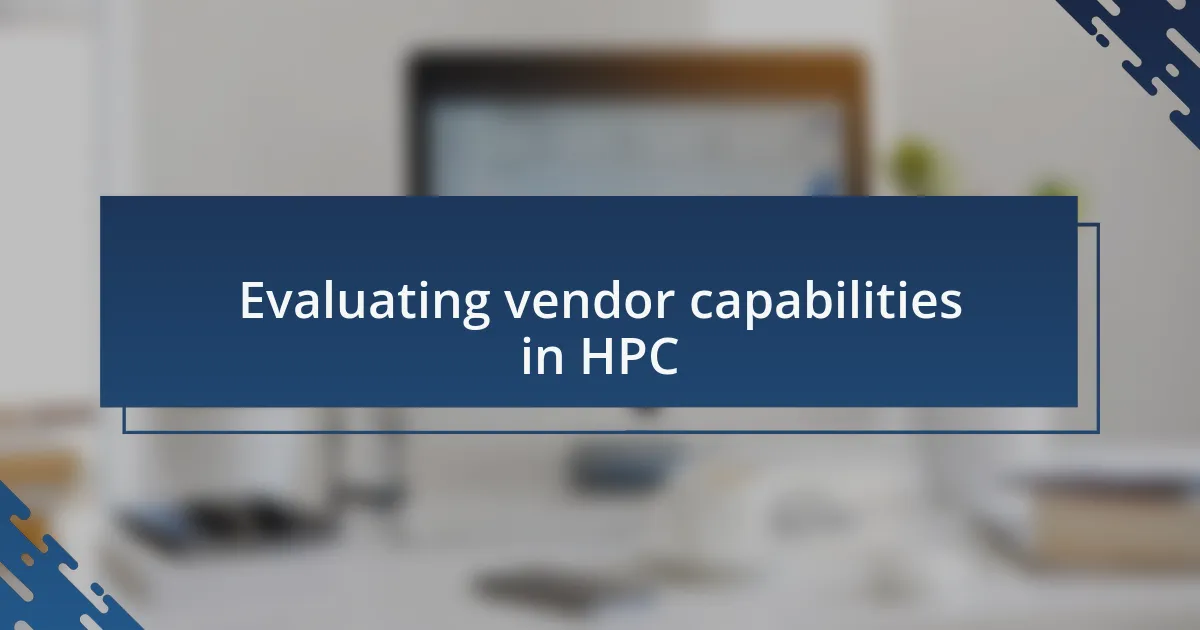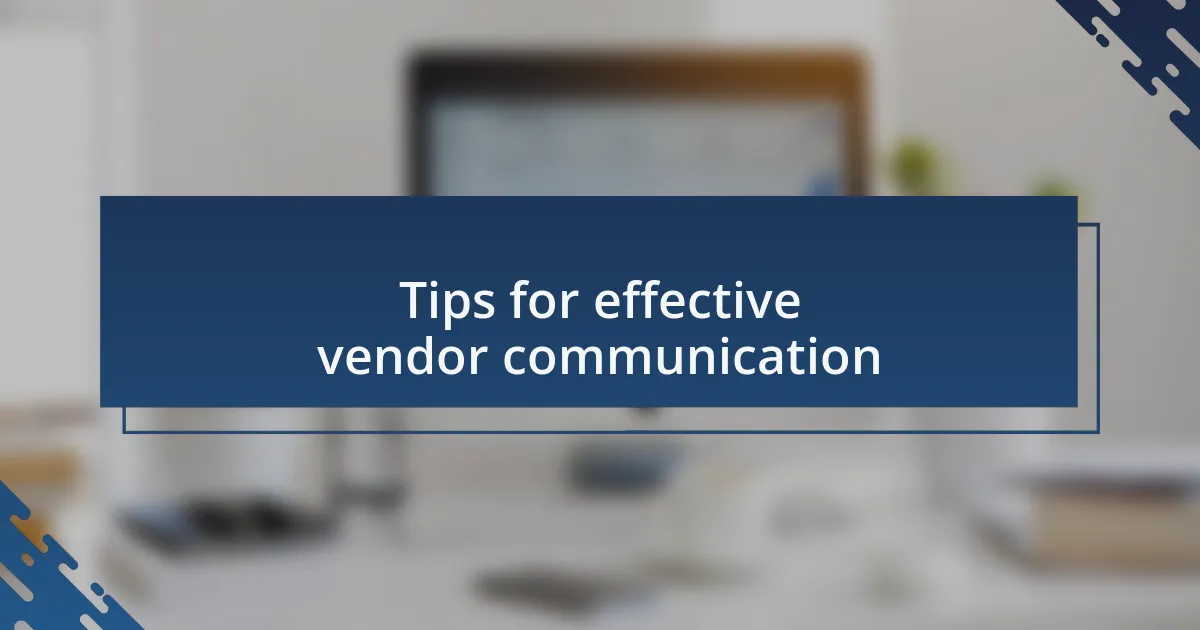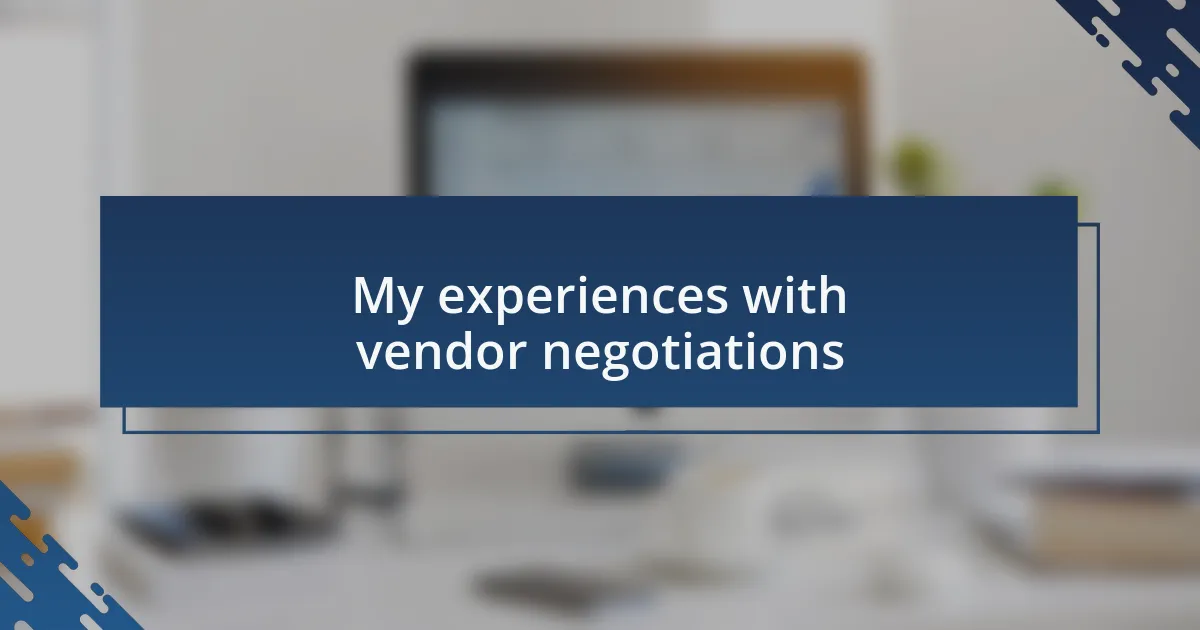Key takeaways:
- Defining clear requirements upfront simplifies the vendor selection process and aligns expectations.
- Evaluating technical expertise, scalability, and customer support are crucial criteria for selecting a vendor.
- Effective communication, including clear expectations and regular check-ins, fosters successful vendor relationships.
- Empathy and preparation in negotiations can lead to stronger partnerships and better terms.

Understanding vendor selection process
When I first approached the vendor selection process, I was overwhelmed by the sheer number of options. It felt like navigating a maze with so many twists and turns, each promising the best solution. I often wondered, how do I know which vendor will truly meet my needs?
One key insight I gained is the importance of defining my requirements upfront. I remember creating a prioritized list of what I needed from a vendor. This exercise not only clarified my expectations but also helped streamline the whole process. Have you taken the time to outline what you truly need before diving into options?
As I engaged with different vendors, I found that their responses revealed a lot about their commitment and expertise. There were moments when a vendor’s genuine understanding of my challenges made all the difference. It taught me that relationships matter; it’s not just about the product but also about who stands behind it. Trust your instincts—do their values align with yours?

Key criteria for selecting vendors
When selecting vendors, one of the most critical criteria I considered was their technical expertise. I vividly recall a situation where a potential vendor presented a solution that sounded impressive on paper but lacked the depth I needed. It was a stark reminder that just because a vendor has a polished pitch doesn’t mean they have the know-how to back it up. Have you ever had a similar experience where it felt like something was just a bit off?
Another essential factor for me was scalability. In the world of High-Performance Computing, the landscape can change rapidly, and I wanted a vendor that could grow with my needs. I remember discussing future projects with one vendor and was reassured by their plans to develop their infrastructure. It made me realize how short-sighted it can be to choose a vendor without considering where you’ll be in a year or two. How often do we think ahead in these decisions?
Lastly, I can’t emphasize enough the importance of customer support. There was a point during my vendor selection where I observed one company’s responsiveness. When I raised a technical question, their quick, informed response gave me confidence in their service. That experience reaffirmed my belief that a vendor’s support system could be just as vital as the technology they offer. Do you think about customer support as part of the equation?

Evaluating vendor capabilities in HPC
Evaluating vendor capabilities in High-Performance Computing requires more than just checking off boxes. There was a time when I was impressed by a vendor’s extensive portfolio; however, it quickly became clear that their capabilities in specialized areas like GPU acceleration were lacking. It’s crucial to dig deeper; have you ever wondered what lies beneath the surface of a vendor’s flashy presentations?
Another vital aspect is the vendor’s commitment to innovation. I remember meeting with a vendor who shared their ongoing research initiatives, which truly resonated with me. Their passion for pushing boundaries in HPC made me feel excited about the possibilities we could achieve together. How often does a vendor’s vision align with your own aspirations in the tech landscape?
Finally, don’t underestimate the importance of testimonials and case studies. In my experience, I was drawn to a vendor that provided specific examples of their successes with clients in similar fields. It not only built trust but also allowed me to visualize how we could tackle challenges together. When assessing a vendor, have you sought out the stories that showcase their real-world impact?

Tips for effective vendor communication
Effective communication with vendors is essential for successful collaboration. I’ve learned that being clear about your expectations from the outset can prevent misunderstandings down the line. For instance, when I defined project timelines and deliverable formats early on, it helped set a solid foundation for our working relationship. Have you ever faced confusion due to vague instructions? Clarity can be a game-changer.
It’s also crucial to create a two-way dialogue. I always make it a point to encourage vendors to share their thoughts and insights. In one instance, a vendor suggested an alternative approach that I hadn’t considered, which ultimately led to a more efficient solution. Isn’t it amazing how open communication can spark innovation?
Lastly, regular check-ins are key. Early in my career, I neglected to schedule consistent updates with a vendor, which left us out of sync. Since then, I’ve prioritized these touchpoints, as they provide opportunities to address issues and celebrate milestones together. Have you noticed how sharing progress can strengthen partnerships? It certainly makes a difference in building trust and ensuring everyone is aligned.

My experiences with vendor negotiations
When I first started negotiating with vendors, I was surprisingly overwhelmed by the intricate dance of give and take. One particular instance stands out; I hesitated too long on pricing and concessions, and I could feel the tension building on both sides. It taught me that being decisive—not just in my offers but also in understanding the vendor’s needs—can create a more balanced negotiation atmosphere. Have you ever felt that pressure during a negotiation where the stakes felt unusually high?
Over time, I’ve come to appreciate the power of empathy in negotiations. I remember negotiating with a vendor who was genuinely passionate about their product. By acknowledging their enthusiasm and aligning it with my vision, we forged a partnership that went beyond just numbers. It was exhilarating to realize that understanding a vendor’s perspective could not only yield better terms but also lay the groundwork for long-term collaboration. Have you experienced a moment that transformed a transactional relationship into something more meaningful?
One strategy that has served me well is being prepared with alternatives. During one negotiation, I presented my primary terms but also had a backup plan ready. When the vendor hesitated on the initial offer, I smoothly shifted to my alternative proposal, which they found more appealing. This flexibility not only kept the discussion alive but also demonstrated that I was serious about finding common ground. Have you ever walked into a negotiation without a Plan B? I can assure you, having one in your back pocket changes the game entirely.